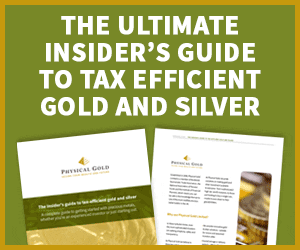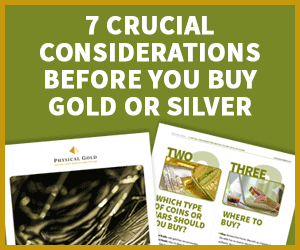Gold Investment – Keeping a Balanced Portfolio Video
15/03/2019Daniel Fisher
Free & fully insured UK Delivery. Learn more
Secure & flexible payments. Learn more

Buyback Guarantee Learn more
In this video we focus on the crucial function gold performs in a balanced investment portfolio. Specifically, I’ll reveal 7 amazing roles gold investment plays and exactly how you can use gold to enhance long term returns and provide portfolio insurance.
While different assets can provide varying returns in your portfolio, inflation always needs to be factored in. In other words, if an equity fund returns 5% year on year but inflation is at 3%, then your money has only really grown by 2%. Some assets like bonds have fixed returns, meaning their actual return after inflation can even be negative if inflation rises. This is certainly true of cash which may return around 1% in the bank while inflation stands close to 3%.
Gold has historically more than kept pace with inflation, providing a degree of wealth preservation.
With traditional currencies such as the Dollar,
Owning gold in the portfolio protects against a weak Pound. In fact, as Sterling weakens, the value of your gold rises, regardless of the underlying gold price. Read our study Gold v Paper Money.
Gold is globally recognised and liquid, especially if you own bullion coins or bars. Not only can gold be converted back into cash quickly anywhere around the world, but it can also be sold in small quantities, enabling flexibility to liquidate part of your holding.
This high degree of liquidity enables the adventurous investor to combine gold investment with less liquid assets such as property and fine wine. Read our analysis or gold investment versus property.
A majority of a balanced portfolio’s assets are dependent on a strong economy to perform well. Stocks and property prices will perform well when an economy is thriving. 2008 was a stark reminder that when the global economy breaks, all your assets can fall in value at the same time. Gold is known as a safe haven asset, meaning it has a particular appeal to investors in times of economic uncertainty. This increased demand, in turn, pushes up its price.
So owning some gold alongside the other economy-dependent assets spreads investment risk in a unique way so that even in a recession, your portfolio value is protected. The majority of independent financial advisors would always advise investors to seek a balanced portfolio of investments.
Tax plays a crucial role in calculating your investment returns. Tax is applied to income on cash in the bank and dividends on shares. It is deducted from gains made on assets appreciating. So what can seem like a strong performing asset, can actually underperform once the tax is deducted.
There are various ways that gold investment can be completely tax free. Gold bullion, for example, qualifies for a UK SIPP pension. That means you get tax relief off your purchase price and any gains made are completely protected from tax.
You can even achieve tax efficiency with gold investing outside of your pension. Investment grade gold is VAT exempt to buy in the UK, while UK legal tender gold coins are also free from Capital Gains Tax.

By owning a percentage of gold in your investment portfolio, it actually reduces the overall volatility of its overall value. If stocks and property fall in value, gold is likely to rise. This irons out volatility and enables a more predictable performance.
Owning bonds, stocks and even cash, essentially amounts to owning pieces of paper with the promise of value. History has demonstrated that this perceived value can fall to zero overnight. This happens if a company goes bust as Lehman Brothers did, a Government defaults on its bond repayments or there’s a run on a currency.
Focusing on physical gold bars and coins reduces this exposure to counterparty risk. Holding the real thing enables you to own a tangible asset with intrinsic value. In a growing digital age, where stock values are increasingly based on future potential rather than profits and the threat from cybercrime, physical gold provides a simple comfort in a complicated world.
If you’ve enjoyed today’s video, please feel free see all 20 of our video guides in the series.
If you’d like to discuss how best gold coins or bars can provide a great balance to your finances, call 020 7060 9992 to speak to a member of our knowledgable team.
Live Gold Spot Price in Sterling. Gold is one of the densest of all metals. It is a good conductor of heat and electricity. It is also soft and the most malleable and ductile of the elements; an ounce (31.1 grams; gold is weighed in troy ounces) can be beaten out to 187 square feet (about 17 square metres) in extremely thin sheets called gold leaf.
Live Silver Spot Price in Sterling. Silver (Ag), chemical element, a white lustrous metal valued for its decorative beauty and electrical conductivity. Silver is located in Group 11 (Ib) and Period 5 of the periodic table, between copper (Period 4) and gold (Period 6), and its physical and chemical properties are intermediate between those two metals.